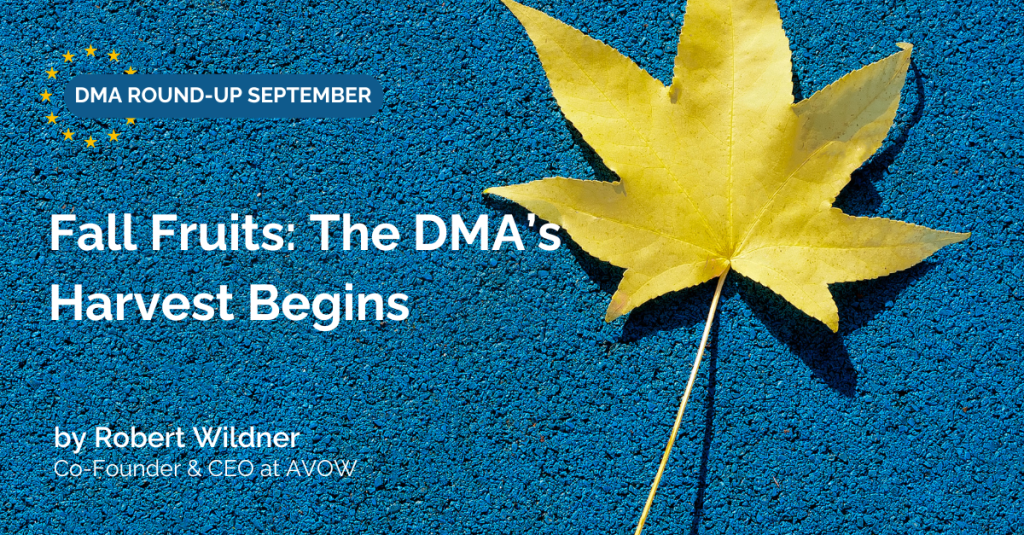This article was originally published on LinkedIn. In this latest in a series of DMA articles by AVOW CEO Robert Wildner, he explores the significant changes in the tech industry as we mark six months since the implementation of the Digital Markets Act (DMA). September showcased notable developments in antitrust legislation, highlighting the impact on Big Tech and the emergence of alternative app stores. Join him as he examines the latest shifts in the app economy and their implications for the future.

September 2024: A Benchmark Month for the Digital Markets Act
Fall is here, and the seasons have changed. Here in Berlin, the temperature dropped 10 degrees centigrade in a week, the sun went in, and—speaking personally—the heating has very much gone on… Despite the worsening weather, the last month was nevertheless a benchmark occasion for the industry in Europe. Technically speaking, it marked six months since the arrival of the Digital Markets Act (DMA), the EU’s flagship antitrust legislation designed to break up monopolies in Big Tech, allowing small developers and alternative app stores to get a piece of the pie too. When it first appeared in spring, few of us in the business believed it would have the impact it has. But half a year later, the results speak for themselves, and September was a shining example of what the legislation can achieve.
From watershed legal rulings to interoperable messaging apps and an influx of alternative app stores, the DMA’s first autumn harvest has been plentiful. So let’s dig in and find out what September had to offer the app economy.
Reaping What You Sow: Apple and Google Fall Foul in Europe
In September, the biggest news was that, after years of deliberation, the EU has separately sided against Apple and Google in two antitrust cases that in fact predate the DMA, costing these monolithic entities a combined 15.4 billion Euros.
In respect to the iPhone manufacturer, the EU Court of Justice upheld the European Commission’s 2016 finding that Ireland had previously given Apple unfair tax advantages, ordering Dublin to recoup 13 billion Euros from the company. Conversely, Google was ordered—in a case that dates back to 2009—to pay a 2.4 billion Euro fine for abusing the market dominance of its shopping comparison service.
Sadly, the bad news kept coming for Apple and Google. Last month, the EU also brandished the DMA rulebook at Tim Cook’s brand, giving it six months to improve the interoperability of its iPhone software or else face a fine of up to 10 percent of its global income. And to make matters worse in Silicon Valley, not only is the European Commission allegedly considering charging Google with DMA noncompliance, but Fortnite developer Epic is also taking the search engine giant to court in the US for allegedly blocking rival apps on its app store…
As such, while these two landmark cases precede the DMA by several years, their outcomes, alongside these recent developments, send a clear message. The era when Big Tech could bully its way to success in the EU and elsewhere is coming to a close.
Autumn Sunshine: Alternative App Stores and Interoperability
But it’s not all doom and gloom. As I remarked in my last update, the narrative surrounding the DMA needs some positive stories as well, and September supplied two gems.
Just look at Apple for example. Following the EU’s decision in April to include iPadiOS under the DMA’s jurisdiction, in September, the iPhone manufacturer declared that alternative app stores will now be allowed on the iPad. All of which is especially good news for gamers, as this means that the Epic Games Store and AltStore PAL are both now available on the device.
Next, Meta has announced that, in an attempt to align itself with the DMA’s framework, both its WhatsApp and Facebook Messenger services will be interoperable with third-party apps from 2027. From then on, EU users will be able to text other messaging services such as a Signal and Viber—and vice versa. All of which is good news if you’re sick of having multiple messaging apps on your phone…
“So where’s this feast of good news?” you might ask. Well, it depends on your perspective. These two developments might seem slight—especially in light of the excess of reporting on DMA-compliance issues—but they are in fact clear evidence that the legislation is working. So while Spotify might indeed be getting angry with Apple for adjusting the headphone operability on its app, it pays to take a “glass half full” approach to the DMA’s progress. Patience, as they say, is a virtue.
Opinion: Is the DMA too old fashioned?
Every month I look online for new DMA-related comment pieces that challenge my perspective, and September didn’t disappoint, with Ralf Boscheck at the Institute for Management Development weighing in on the DMA’s potential to stymie growth and innovation by penalizing big companies.
While there are a lot of articles in circulation saying similar things, Ralf makes a good case by examining the legislation’s history. Compared to the EU of old, he argues, the DMA’s “top-down” approach to enforcement is a bit old-fashioned. Twenty-five years ago, he writes, the EU also reformed competition policy, setting limits on market shares. Companies exceeding those limits subsequently had to justify why or face penalties. In addition to this, he contends that the US’s antitrust laws could be an example for the EU to follow too. In America, he argues, “having market power, even a monopoly, from a superior product or business acumen doesn’t violate the law.”
While I don’t agree with Ralf’s perspective, it’s an excellently argued piece and one that gives much food for thought. Overall, I concur with his sentiment—the EU shouldn’t be gratuitously penalizing big companies! But in the end, I don’t follow his interpretation of the facts. Ultimately, if the EU’s old competition laws were so robust, why has it replaced them? Indeed, if the US’s antitrust laws are so effective, why has it taken the US Justice Department four years to hold Google to account? The answer is because these old pieces of legislation are simply no longer fit for purpose in today’s digital landscape.
And that’s all, folks! I’ll be back again this time next month with a post-Halloween update.
—Robert.







